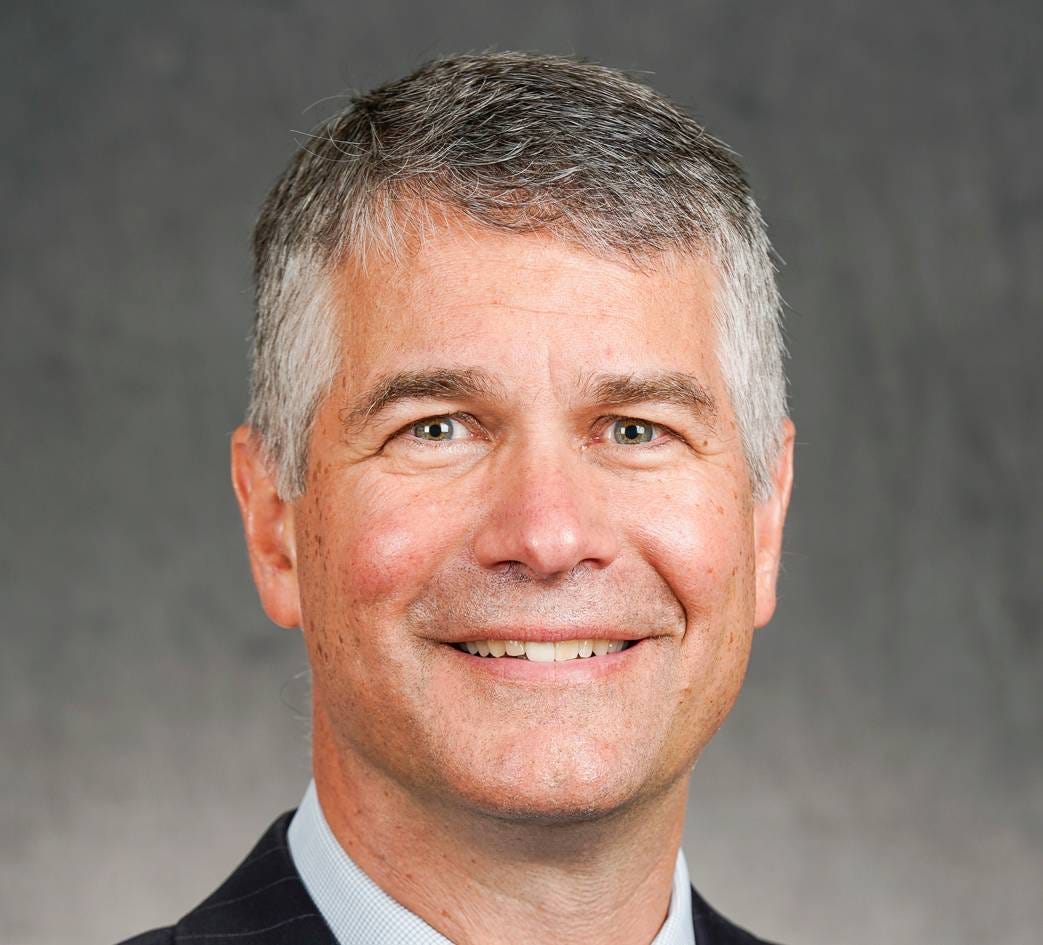In this episode, Minnesota State Representative Larry Kraft shares about the state’s ambitious, progressive transportation policy, which includes climate accountability measures that no other state has implemented.
Text transcript:
David Roberts
In 2022, Democrats narrowly won a trifecta in Minnesota — House, Senate, and governor — whereupon they launched into an absolute frenzy of activity, passing bills on everything from abortion to paid leave to gun control to free school lunch to clean energy. Vanity Fair called it a “tour de force for progressive legislation.”
I covered the state’s new clean-energy law on a previous pod, but I also wanted to take a closer look at the big transportation bill that was signed in May. It passed somewhat under the radar, but it’s got some very cool stuff in it.
One key feature is that it requires both state and municipal transportation-planning agencies to take the state’s climate goals into account when assessing new projects — to hold themselves accountable to those goals. As obvious as that may seem, it’s not something any other state has done.
To discuss the significance of this and some other provisions of the bill, I contacted one of its primary authors, first-term state Representative Larry Kraft (D). We talked about what these changes mean for transportation planners, the kinds of transportation projects that can reduce emissions, the new money the state will raise for public transit, and the state’s new e-bike incentive (!).
By the way, if you enjoy this conversation, you should know that Kraft co-hosts a podcast of his own, on climate policy in small and mid-sized cities. It’s called City Climate Corner, with co-host Abby Finis. Check it out.
All right, then, with no further ado, Representative Larry Kraft of Minnesota. Welcome to Volts. Thank you so much for coming.
Larry Kraft
Oh, my gosh. Thank you for having me. I'm super excited to be here.
David Roberts
This is cool. You are a freshman legislator. You entered the Minnesota legislature in 2022, last year. It's sort of hilarious to me: You slipstreamed into the most exciting and productive legislative session for Democrats in living memory that I'm aware of. Like, I hope, you know, on some level, this is not what politics is normally like, Larry.
Larry Kraft
Yeah, I have good timing. And I tell you, I hear that. And what I tell people is, you know "I'm sure you're right. But at this point, it's all I know. So let's keep going."
David Roberts
Yeah, you just go in and you start passing bills, changing things right and left, wow. The Minnesota success story, I think people have heard a lot about it by now. There's more bills than you can shake a stick at, more progress, just a wild amount of progress. But let's focus on transportation. So Minnesota is similar to many other states in that transportation has become the largest source of greenhouse gases in the state. I think it's 25% —
Larry Kraft
Yeah, 25, 27%.
David Roberts
— in Minnesota. So this is sort of my overall impression: Especially at the state level, is there's been this sort of, like, parallel tracks going for a while now of on the one side, happy climate talk, which ends up mostly focused on the easy stuff, which is electricity, right? And then transportation over here on this other track just expanding, getting more and more carbon intensive willy nilly, and the twain have not really met. So this is like what's happening in Minnesota, really. To my mind, maybe Colorado got there a little bit ahead of you. But really what's happening in Minnesota is the first time that people grappling with climate change really are taking on transportation in a serious way.
So let's start by just talking about what kind of targets are on the books in Minnesota now, prior to this transportation bill. Let's just talk about sort of like, what targets have been set in terms of greenhouse gases and in terms of VMT, vehicle miles traveled.
Larry Kraft
Right. So in 2007, Minnesota passed. Actually, it was a bipartisan bill on climate that set state goals as 80% emission reductions, greenhouse gas emissions reductions by 2050, and then set some interim targets. In this last session, we updated that to be net zero by 2050. And then on the transportation side, there's been folks that have been working on this for a few years and set a vehicle miles traveled reduction goal of 20% reduction per capita by 2050 and 14% by 2040.
David Roberts
Are those targets, are these sort of aspirational things, or are those binding in some way? Are those statutorily binding?
Larry Kraft
They were not statutorily binding. It was in a climate action framework that the governor initiated that the VMT target started. But I think what we did this session was to give some teeth behind them and some mechanism to actually achieve them.
David Roberts
Right. So before we get to that, let's talk a little bit about RMI. Rocky Mountain Institute did a big study basically looking at what would happen for Minnesota were it to hit those VMT goals, what would be the sort of economic effect, say a little bit about those conclusions and how it came to those conclusions, like why those things would happen.
Larry Kraft
RMI came and did a presentation about what was going on in Colorado early in our session. And then we're doing the analysis on Minnesota. But what they said was, if we could hit the vehicle mile travel goal of 20% reduction per capita by 2050, it would save Minnesotans $91 billion. And that was from a mix of things like just number one, not needing to drive as much and the cost of cars being $10,000 - $11,000 per year. Saving money there, but also a lot on the health side by the fact that you'd see a reduction in air pollution and the savings that would come from that and then also just from not as many people dying on the roads would be a significant savings.
David Roberts
So $91 billion cumulatively for the state, which I think I saw, RMI broke it down. It's like $3 something billion a year, which is not a small thing in a state the size of Minnesota.
Larry Kraft
No, it is not.
David Roberts
So this is a worthy goal. So you passed this big transportation bill. It has a bunch of stuff in it, a lot of things. But what I found most intriguing is the requirements it puts on transportation planning agencies. So explain to us what the Minnesota Department of Transportation has to do now that it didn't have to do before this bill passed. What is the new regime?
Larry Kraft
Right. So it starts by saying that MnDOT — MnDOT is how we refer to it — has to set greenhouse gas emission reduction goals statewide, commensurate with the overall state goals, and then has to split them out regionally in a way that makes sense. And specifically that means in certain areas of the state, more metropolitan, there's going to be a bigger opportunity to reduce emissions and VMT than there may be in some greater Minnesota areas. So it has to start by doing that. And then what it has to do is look at if there are new projects on its system that were to increase capacity or increase VMT and emissions, that it then will have to offset them in some other way.
David Roberts
Yeah, I want to get to that. But it also puts this same obligation on municipal planning organizations, does it not? So at the state level and then also at the municipal level.
Larry Kraft
It requires for the metropolitan regional planning organizations, especially in the Twin Cities area, which is the seven-county area around Minneapolis and St. Paul, it's about 55% of our population. So yes, it does that there. And then the other piece of it is for the metropolitan area, that organization has to incorporate those targets into its regional plan such that cities that are part of the region have to incorporate the climate targets as well as the VMT and greenhouse gas emissions reduction targets and transportation into their comprehensive plans.
David Roberts
So it's kind of a fractal thing here. The Minnesota Department of Transportation has to plan around these emission goals and then, at the smaller level, the municipal organizations do. And specifically, the Twin Cities Metropolitan Council has to incorporate that in its city planning.
Larry Kraft
Correct.
David Roberts
It's kind of funny. Like these states pass these greenhouse gas targets, which you would just assume, well, of course, the transportation agencies have to take those into account too. Like, why wouldn't they? But as far as I know, this is the first — I mean, this goes beyond even what Colorado did, I think, doesn't it? I mean, are you aware of another state that has formalized this kind of thing for its transportation planners?
Larry Kraft
Not in the same way that we have. I think there are pieces of it and we certainly learned a lot from Colorado. We talked to them and we modeled the way we were starting from a lot of things that they were doing. But we definitely really thought about there was a piece of this that was transportation focused on MnDOT and the fact that you have to address land use to really get at long-term transportation emissions reductions. And so there was another part of the bill and initially started as two separate bills, but the other part was very focused on land use and how do we incorporate that? And then, they came together.
David Roberts
Interesting. And the land use stuff is mostly down at the regional and municipal level, right? I mean, that's where most of those decisions are made.
Larry Kraft
Correct.
David Roberts
And now those decisions have to be made with greenhouse gas goals in mind.
Larry Kraft
Yes.
David Roberts
It seems to me on some intuitive level that if you have a project that is going to expand highway capacity, it is almost by definition going to increase greenhouse gases and vehicle miles traveled, is it not? And so if the state goal is fairly rapid reduction in greenhouse gases in VMTs, it looks like the implication is you just need to stop building new highway additions. I assume that's not what's going to happen. So how does that work out? How do you do an addition to highway capacity that doesn't increase VMT or GHGs?
Larry Kraft
So the interesting thing is in working through some of the objections on this with the city and county engineers, they analyze some previous projects and sometimes you have a project where you're maybe expanding capacity, but it eliminates a lot of congestion that has flowed over onto other roads. So the GHG emissions might in some cases not be negative or might not be all that negative. VMT is a little bit of a different story. So what the bill provides then is that if there are increases from induced demand or whatever, that they then have a prescribed set of things that they can do to offset that.
Ideally first within the project themselves, maybe it's by adding more transit, maybe it's by adding some micromobility or some bicycle pedestrian infrastructure, but there's a set of things that can be done to offset any induced demand increase.
David Roberts
Let me pause on this induced demand question, because this is one of the sort of long-running issues in transportation. One of the long-running controversies is that the Greens are always yelling that these state departments of transportation make these completely unrealistic calculations. Like if we add another lane to this highway, it will ease congestion and everyone will flow faster. And then inevitably what happens is you add the lane, more traffic comes to fill up the lane, congestion remains as bad or worse than ever. This repeats over and over and over again. So who's going to be sort of in charge of the analysis, I guess is what I'm asking?
Who is making the calculation about whether and how much a project will reduce or increase those metrics?
Larry Kraft
That is the responsibility of the Department of Transportation. That said, they do have to publish the results of the analysis on any project on their website, so there's a transparency that's required within it.
David Roberts
And so people can check. Are they cognizant of this induced demand thing? Would you say that they're relatively progressive in the way they do these calculations? Because state departments of transportation vary very widely across the country.
Larry Kraft
Yeah, well, I will say that I think they are and they were a willing partner as we created this legislation.
David Roberts
They're not going crazy in opposition? That's another thing I was going to ask about. This seems like this would be exactly the kind of thing they hate. What was their sort of disposition around it?
Larry Kraft
You know, because there had been work done over the past several years in Minnesota on this stuff. A few years ago, they brought in someone by the name of Tim Sexton who's the Assistant Commissioner of Sustainability Planning and Program Management. So I don't know how many DOTs have someone with that title, but he's explicitly focused on this kind of area. So they kind of knew that something like this might be coming and had thought through and were prepared to have good discussions on it.
David Roberts
Interesting. So the party that is proposing the expansion of the highway is the party that will be responsible for offsetting its emissions. So, who is that party? Is that generally a private developer? Is that the state? Or, who exactly is the person or entity in charge of these expansions?
Larry Kraft
This is one of the things we had to work through in that it happens in different ways. Sometimes it is the DOT themselves that's doing it, but often it may be a regional planning organization or a city or a county where the funding is coming through. So they're responsible for thinking through what happens with their project. And the way this works is ideally you would find a way to offset it within the project itself. But if they can't for some reason it is possible then to offset any increases in a series of other ways of looking at things in areas that are more challenged from an environmental justice perspective or elsewhere within the region. Or even if not, they can look statewide.
David Roberts
Hmm. So if I'm I don't know a city in Minnesota and I'm proposing to widen the highway coming into the city, so I submit that project to the state DOT, state DOT, analyzes it and says "this will in fact increase greenhouse gas emissions and VMT." So I, the city planner, then first look at the project itself and try to figure out how to do it more lightly. Or then I look around at other things I could do in my city. And then if worse comes to worse, I look around statewide and I'd find projects that what reduce VMT and greenhouse gases.
Larry Kraft
Exactly.
Larry Kraft
There is an interlinking process that's specified, and so it looks at things that you can do locally, but if not, you can connect with other projects or other actions elsewhere within the state that would reduce emissions. So, maybe you can't reduce emissions where you are, but maybe there's something else you can interlink with that is where transit is being added or where additional pedestrian or bicycle infrastructure is being added in another project. And so you can interlink the projects.
David Roberts
And so, what are these offsets like? What are the sorts of things if I'm the city planner and I'm trying to offset the increases from my highway widening, what are the kinds of things that are on the table here?
Larry Kraft
Right, so there are nine of them listed right now. One is a transit expansion. Another is transit service improvements, active transportation infrastructure, micromobility infrastructure like shared vehicle services, transportation demand management like van pool or shared vehicle programs, parking management, changing production of parking requirements, parking cost adjustments, land use could be residential or other density increases, mixed-use development, transit-oriented development, Infrastructure improvements related to traffic operations like roundabouts or reduced conflict intersections. And then also one for natural systems in the area such as prairie restoration, reforestation, urban green space. So those are the things that are envisioned right now.
David Roberts
Interesting. And all of those are sort of within a city's power because I'm just sort of imagining these sort of cross jurisdictional. I mean, one of the big problems with transportation policies, I'm sure you're aware, is it crosses over so many overlapping jurisdictions and overlapping areas of control. I'm just wondering if it's always going to be in an individual city's power to make all these other changes, is it going to have to collaborate with other agencies or other levels of government?
Larry Kraft
Yeah, so in many cases they will have to. And as we work through this, this is a process that happens quite a bit today of coordination across regions. But one of the requests from the city and county engineers and the Department of Transportation was to create a working group, which has started meeting, to figure out in more detail how impact mitigation can happen, how there can be a trading between different projects. So one of the things we did in the legislation was create this working group that's meeting now and will come back with recommendations on how to implement this in specific by the end of the year.
David Roberts
And it will be the state DOT that is also responsible for assessing those mitigations and putting a number on them, sort of quantifying them?
Larry Kraft
Yep.
David Roberts
The reductions have to outweigh — this is another question I had: When you say the project has to be in line with the state goals, you could read that a couple of ways. One, you could just say, "well, it can't increase greenhouse gases and VMTs." It has to reduce them. But to be in line with the state's goals, the state's goals require relatively rapid reduction. So, is there a case where a project will have to mitigate more than all of its increases?
Do you know what I mean? How much does it have to decrease them, or does it just have to come in negative at all?
Larry Kraft
Well, I think the way we worded it was such that the projects had to be consistent with MnDOT meeting its goals. So that does envision some level of reduction, not just offsetting. So the portfolio of projects that are being done have to be meeting these reduction goals. So there is some level of emissions reductions that would be envisioned in that.
David Roberts
And one thing I didn't hear among the list of mitigation actions was anything about EVs, just getting more EVs on the road. How do you see that? I mean, obviously that's not going to do anything for VMTs, right? It will do something for greenhouse gases. How do you see EVs fitting into all this? Are they going to be one of the tools in the toolbox of the sort of city that's contemplating something like this, or do you want to keep that separate?
Larry Kraft
Well, initially we had kept that separate. It's possible that this working group can come and say, hey, look, we'd like to include it for X reason, but I think EV is super important and we need to hit that hard as well. But part of the reason for this is that the transition to EVs won't happen fast enough in order to reduce emissions to where we need to. And so VMT is really important to do that as well. Additionally, by getting at VMT reduction, we make the transition to electrification easier and faster.
David Roberts
Yes.
Larry Kraft
So we're keeping that separate to focus this on the infrastructure I would say. But you know, we'll see if someone proposes a unique way to incorporate it.
David Roberts
Minnesota, though, has separate EV policies, though, right?
Larry Kraft
Yes, we know.
David Roberts
At this point, I'm repeating myself a little bit, but I just want to underline that it is a little wild that this is the first time a state has told its Department of Transportation: "No, we're really serious about those goals we passed. We really mean it. Act on them, take them seriously." You're the first state to do this. You said you worked with MnDOT productively. Have you gotten feedback from the city level, the municipal level? I'm sort of curious what city level policymakers think of this, because in some sense, it's going to be mostly cities where this plays out.
It's mostly cities where these mitigation actions are going to be taking place, adding bike lanes and whatnot. Have you gotten feedback from the municipal level?
Larry Kraft
Yeah, I would say cities and counties. So, yes, as we worked through this legislation, there was a lot of interaction at the city and county level on the traffic planning side, met a lot with city and county engineers, and one of their biggest concerns was how would this impact projects that they were working on?
David Roberts
Currently working on?
Larry Kraft
Currently work on. Like, "Oh, my gosh, I'm doing route X Y and you're going to make me stop." So one of the things that we did is said, "No, look, it's not reasonable for us — with an engineer, if you've got something planned out, the last thing you want to do is throw them a wrench midway or close to the end of the project." So we dealt with that by saying, "Look, this is going to start in February of 2025 for anything that's not in an advanced stage of design. So you have time to think about it, you have time to plan it into your process."
David Roberts
Right.
Larry Kraft
Another issue that was raised quite a bit was around safety and was pushed a lot to say, "Hey, we should exempt projects if they were being done just for safety reasons." And after some thought, I really pushed back pretty strongly against that because that would be putting safety against greenhouse gas or vehicle miles traveled reductions. Like, you can do one or the other, but you can't do both together. And that's just not true. We have to do both. And in fact, in many ways, doing vehicle mile traveled reductions will increase safety. It's been shown to do that.
So the real thought was, look, just as safety is one of the foundational things that you must do in transportation planning, we're elevating these greenhouse gas VMT climate considerations to be at a similar level. So when you plan a project, it has to be done with safety as well as with climate considerations. They also came back about the Mitigation Working group. That was a thing that they worked on with MnDOT, proposed back to me that we could really use time and a group to think of exactly how this is going to work and exactly how the trading across projects would work.
David Roberts
It's a lot of devils in those details, I would imagine.
Larry Kraft
Right. And also, not something necessarily that from a legislator that I could go in and say, "Boy, this is how it needs to work." It was obvious that when they came up with this idea, it was a really good idea. So we put that in.
David Roberts
I could see this going a lot of different ways. The whole discussion about offsets generally is, I think, there's a lot of suspicion about offsets, and this is a different kind of offset, a different context. But some of the problems still seem to apply, which is, are all the entities proposing projects going to be flooding to the same cheapest, lowest hanging fruit offsets? Which I'm not sure what those would be. Maybe just like a car sharing program or a van sharing program, just the easiest. Do you think this is actually going to sink its teeth deep enough to get big projects in the works, like big new light rail or serious density or serious rezoning?
Do you think this is going to prompt the kind of big bold things that need to happen at the city level to really change the transportation landscape?
Larry Kraft
That's a great question. I do think it will change the way people think about transportation projects. I remember one of the meetings I had with the city and county engineers and they said, "You know, we can't really do this well unless we deal with land use." I'm like, "Absolutely." Now, that said, you kind of made it sound these big, huge projects. I do think at the same time, this year we put a lot of money behind our mouth here in that we created a new sales tax within the metro area that's going to generate $440 million for transit and then ramp up from there per year.
David Roberts
That's in the Twin Cities area.
Larry Kraft
Yes.
David Roberts
Tell me a little bit about that tax, because a new tax is obviously a big thing, controversial. How did that come about? Was this just looking for revenue sources for transit?
Larry Kraft
The transportation committee — and this was in the house led by chair Frank Hornstein — was looking at the full transportation needs across the state. And we had been, I would say, underfunding transportation for a number of years. So there was a big gap and there was a number of mechanisms, fees and things we used to close the gap. And for transit, especially in the seven county metro area, was a three-quarter cent sales tax, of which most of that goes to transit. And so that was the key way of addressing the money we need on an ongoing basis for transit.
David Roberts
Well, a sales tax, as I'm sure you're aware, is one of the most regressive forms of tax. Were there other kinds of taxes discussed? More progressive taxes? Like, I live in Washington, in Seattle, where we don't even have income taxes, and so we end up funding everything with sales taxes. And this is a source of great angst for our local progressives, because on the one hand, you want to do good things, but on the other hand, you don't want to crank up the financial pressure on the poorest people to do them. So did you hash through those issues?
Larry Kraft
There were a lot of things that were looked at. This was the one that was doable. And I will say I totally agree that in general, sales taxes are regressive, but so is lack of transit.
David Roberts
Yeah, it's true.
Larry Kraft
Really regressive. We heard a story of one math teacher, middle school math teacher, whose car broke down and used to take 20 minutes, half an hour to get to work and then in transit was taking an hour and a half to 2 hours. So that is incredibly regressive. And so it's certainly an issue, we think, with where this money is being directed, that it makes sense and maybe for where we're at overcomes the regressive nature of the tax.
David Roberts
And is this tax money devoted to transit by law or is there room, fuzziness in there?
Larry Kraft
It's devoted by law.
David Roberts
So this all goes to transit.
Larry Kraft
Just to clarify that the three-quarter cent sales tax, I think it was five-eights of it go to transit. And then the remaining one eight, I think, is for roads and bridges in the area.
David Roberts
So most of it for transit.
Larry Kraft
Yep.
David Roberts
And for those of us who don't have the pleasure of living in Minnesota, what's the transit situation now? You got the Twin Cities area, is your big metro area. Is there light rail? Are there subways? Are we talking about mostly buses here? Like, what is this money going to be going to?
Larry Kraft
It's a combination. There is light rail that's expanding, and there's buses and a lot of new bus rapid transit.
David Roberts
And isn't there somewhere in the bill a big long distance passenger rail line, am I making that up?
Larry Kraft
No. No, you're not. There is. Looking at a passenger rail line from Minnesota to Duluth. Duluth is about two and a half hours to the north of us, right on Lake Superior. So there's a line there. And then it's also investigating a line that would go from Minneapolis up to Fargo-Moorhead area.
David Roberts
Interesting. Are those high-speed or are they just normal Amtrak rail?
Larry Kraft
They're not high-speed in the sense I mean, the one to Duluth, I think the top speed would be around 90 miles an hour or so. 90 - 100 miles an hour.
David Roberts
Not like French or Amsterdam.
Larry Kraft
No. Or the Japanese bullet trains. Not that fast, but still pretty good.
David Roberts
Okay. See, aside from this new requirement on transportation planning agencies, which is a novel thing in the world, as far as I'm aware, there's a bunch of other stuff in this transportation bill, as you say, there's a new sales tax which is devoted mostly to transit. What are some of the other, I mean, this thing is a bit of a transportation Christmas tree. There's all sorts of delights in there. What are some of the other pieces that are worth sharing?
Larry Kraft
The other pieces to this is that we connect to the metropolitan area. So within the metropolitan area, the Metropolitan Council, which is our regional planning organization, needs to take the targets developed by MnDOT and build them into their regional climate action plan, and then those become guidelines for each city's comprehensive plan the next time they do comprehensive plans. And that will happen in the 2026 to 2028 timeframe for comprehensive plans for cities that go through 2050.
David Roberts
Interesting.
Larry Kraft
So they will have to now build in climate considerations as well as land use transportation to match the things that MnDOT has put together.
David Roberts
And that's new?
Larry Kraft
That is new.
David Roberts
I meant to ask this before, and we were talking about mitigation measures, but I would assume that zoning changes qualify here as mitigation measures. Or do we know that yet? Has that remained to be seen?
Larry Kraft
Well, there's certainly specifics to be worked out, but that would fall under the land use mitigation action. So yes.
David Roberts
Yeah, because I know there's been a lot of good work in the Minneapolis area on this stuff already.
Larry Kraft
Yes, Minneapolis has done some land use changes in their 2040 comprehensive plan.
David Roberts
And there's some money for bike and pedestrian infrastructure. What's that look like? How does that play out?
Larry Kraft
Yes, there's a bunch of money for active transportation, grants and the like. And then there's also a new program for e-bikes, a rebate program for e-bikes.
David Roberts
Everybody's favorite. How big, what's that look like?
Larry Kraft
I think it's 2-3 million a year for the next couple of years, and then we'll see how that goes. And I imagine — It's interesting, it's one of the things I get asked about the most is, "Hey, when's the e-bike credit available?"
David Roberts
People are fascinated by this whole subject.
Larry Kraft
So we'll see; that might run out quickly.
David Roberts
And that's just like point of sale rebates type of thing. And I know Colorado piled some of its own EV rebates on top of the federal EV rebates. Have you guys done that at all?
Larry Kraft
We did. That was not in a transportation bill. The EV rebates were in our energy bill. And we put rebates in for new vehicles, I think $2500, and used $600. And we kind of matched the federal guidelines to what kind of vehicles they would apply to. So for the new vehicles, it's anything under $55,000 in sales price and for the used, anything under $25,000.
David Roberts
Interesting. What about equity? Obviously when transportation, energy or transportation honestly, equity is hovering around that discussion, it's inevitably the most vulnerable and the poorest communities that suffer the most from transportation pollution tend to have the least access to transportation choices, et cetera, et cetera. What sorts of things are built into this bill to address the equity question?
Larry Kraft
That was a really key part of this. And when we look at the mitigation aspects for mitigating an increase in emissions if it's not doable within the project itself, the first place that a project is expected to look is within an area that's been impacted by environmental justice issues in the past. And maybe that's living close to a highway and subject to higher degrees of air pollution or lack of access to transit or anything that folks have been impacted on an environmental justice perspective. So that's the first place that folks are supposed to look for mitigation. And after that then you go to other areas within the region and statewide. So we tried to build that in the plan right up front.
David Roberts
You know, I threw this out on Twitter. One question I got a lot of which I think is on the mind of anyone who has been involved in these sorts of programs, which is: What about accountability? So say I'm proposing a highway widening project. MnDOT runs the numbers, tells me it's going to increase VMT. And so I'm looking around for mitigation measures. I spend a bunch of money on, I don't know, a vanshare program in a low income community. And then, you know, "based on our projections that will reduce VMTs X amount, you're clear to go build your project."
Is someone following up to see if the program, the vanshare program, actually does reduce VMTs? In other words, is this all prospective, or is there some follow up here to ensure that these targets are actually being met?
Larry Kraft
Well, that's a great question. And as this is not yet implemented, we have some thinking to do on how that happens. But because this is an overall goal for MnDOT overall and many of the mitigation actions are around greenhouse gas emissions and VMT within their network, I think there's somewhat of a built in tracking mechanism built in that they have to keep looking at that. But as we get to some other mitigation actions that maybe go outside of that, I don't think yet we have in the legislation, about how do we make sure that that happens and follows through? It's something that is worth thinking about as we implement this in the coming years.
David Roberts
Yeah, and I was wondering the same thing. You tell a city to account for these things, but what happens if the city doesn't? Is there a stick here if either MnDOT or the sort of municipal organizations don't do this or don't do it well, is there a penalty?
Larry Kraft
Not currently in the legislation here. But some of these processes that are being worked —like with I talked about that the cities would have to build in things into their comprehensive plans. That's an existing process. One of the things that we tried to do with this is build it into an existing process that folks were used to working, and where there's some back and forth that happens in accountability in multiple cycles of the processes. So that's the hope with it. We'll have to see, as this gets implemented if there's other sticks and things that are needed.
David Roberts
Yeah, and I was also wondering if there are and maybe this is something to think about in the future, too, if there are carrots for municipal regions or counties that go beyond what's targeted, sort of above and beyond what's expected based on these goals, are there inducements to exceed these targets?
Larry Kraft
Yeah, that's a great question, and I always prefer carrots to sticks. So though sometimes you need both of them. I think one of the things that the working group has said is: "Look, we're going down this path and we think we might want to ask you to provide more money to be able to do some of these mitigations." And I've told them: "Look, I'm open to kind of revisit this and propose some things as we figure out how this is going to be implemented." So I think it's likely that something like that will happen, but we'll see.
David Roberts
Let me ask you then about the politics of all this. Kind of famously, Democrats won a trifecta in Minnesota in 2022 and are going hog wild doing stuff which is just so counter to the norm in US politics that everyone's sort of, like, staring with their jaw open. But specifically on transportation, as you were forming this bill, is this just a Democrat versus Republican thing? Is there any more nuance to it than that? Did you get any Republican help? Were there any unexpected allies or was there any opposition from within what you think of as your coalition? Like, how did the politics shape out?
Larry Kraft
Yeah, well, the other thing I want to point out is this legislation we're talking about got rolled into this broader transportation bill.
David Roberts
Right.
Larry Kraft
So there's a lot of politics about the broader bill as well. But on the stuff that I was working on, I don't think I got much in the way of Republican support for it. That said, my approach was to meet with everyone that had an objection and listen carefully to it and incorporate what made sense. And that worked out very well in terms of, I think, making the bill and legislation better. And so at the end of the day, while I might not have gotten any Republican support, I think the opposition wasn't as strong as it might have been.
David Roberts
Yeah, because you would think, like, the stereotype would be that Republican is rural, rural areas hate all this and will fight it. I don't know if that's what you found?
Larry Kraft
To a certain extent. But the way we address that is by saying, first of all, that in many ways they were right, that it's harder to reduce VMT in a greater Minnesota area than it is in a metro area. So then, the instruction for MnDOT was to set targets appropriately, recognizing that you may need to get more reductions from metro areas than rural areas. Another thing that was raised was, "Look, when we do a highway expansion or a grade separation, it may pull a bunch of traffic that previously was on more local roads." So what we said was: "Look, it's not VMT on a certain road, but it is on the network."
So we're able to say: "Look, that's a good point. You want to look at the network overall so that we properly take into account stuff." They raised objections and where it made sense and made the bill better, I incorporated them.
David Roberts
But you wouldn't characterize the opposition to this, to your piece in particular, as something that the statewide GOP sort of rallied around, freaking out about. I imagine they had so much to freak out about this past year. Maybe you escaped some of the worst of it.
Larry Kraft
There was certainly some opposition, but I think we dealt with it in an intelligent way. And, yeah, there was a lot of other things they were freaked out about. So maybe this got less freaking out than it might have in a non-trifecta year like this.
David Roberts
It would be so fascinating to see what, if anything, comes up in the implementation of it. Right? It's so hard to predict. It's kind of a new thing. It would be really interesting to see what sorts of issues arise. Let me ask you about something that's sort of outside of this, and maybe you won't have anything to say about it, but I feel like it's germane to this discussion at least. So Minneapolis is increasingly beloved of the national urbanism community. It's doing all sorts of great things with zoning and transit, etc. And it had this really bold plan for 2040, this really bold vision for 2040, which involved transforming zoning across the city.
Lots of infill, lots of density, etc. Really like a green urbanist's vision thing. Everyone loved it in my world. Along come some local NIMBYs forming groups with "environmental" in their name, sued the thing, and now a judge has put a stop to it, sued it specifically, saying it will be bad for the environment. And the judge stopped it specifically on the grounds that it will be bad for the environment, thus causing everyone in my world to want to tear their hair out. I wonder if you just have any comment on that situation in general, how you think that's going to play out, what you thought of that judge's ruling, and how you think that's going to play out.
Larry Kraft
Well, in terms of how it's going to play out, I don't know that I can have my crystal ball that accurate on it. But I will say I think that the objections to it are incredibly short-sighted. And so I hope —
David Roberts
You don't think casting a shadow on a neighboring building is sufficient damage to the environment to warrant stopping the whole thing?
Larry Kraft
And, you know, the things that Minneapolis is trying to do — and by the way, I would like to try to do some of those on a state level. I really appreciate that you did an episode with Jessica Bateman in Washington, you know, we want to look to do things like that in Minnesota. So that's one thing. I think we can do things at a state level. But to object to what Minneapolis is doing on an environmental basis when what they're doing is really beneficial to the environment long term and to climate action just strikes me as really short-sighted. And it does feel like NIMBYism.
David Roberts
And this sort of gets at my broader question, which is once the rubber hits the road, once these municipal organizations are really told, like, "No, you can't expand that highway unless you do some other stuff, unless you do some rezoning or bike lanes or whatever," are you worried about local NIMBY opposition? Like, everybody in my world is worried about this. All the kinds of changes you're talking about to mitigate GHGs and VMTs all frequently face this sort of opposition. Do you lose sleep over that?
Larry Kraft
Well, I certainly worry about it, but I will say the kicking off of this implementation group that got going was really encouraging to me because there were folks in there that had some real objections to it. But they put those aside and said, "Alright, let's figure out how to make this work." And I think with engineers and with planning stuff, if you give enough runway and say, "Look, these are the boundary conditions with which you have to work with," they can do it. And I'm really convinced that they can. The problem comes in when you change those boundary conditions on them at the last minute.
But if you can say, "Look, this is what you need to plan for the next 20 years, this is how you need to think," then they will build that into their approach. So my hope is that through this implementation group, the issues will come up, but we'll figure out the right kind of planning structure and implementation structure to make these trade-offs and then it will just start working.
David Roberts
I mean, it's one thing to have a plan. It's another thing to stick to your plan when you confront a room full of elderly people in matching T-shirts screaming at you, that's a different kind of thing.
Larry Kraft
I tell you when I started this process and folks would come with objections, I'd say, "Look, I'm really open to listening to all and working them in, but we have to start from the perspective that the Earth doesn't negotiate with us. We have to get to this point. So let's talk about how let's talk about if you have changes to make this better or to deal with objections that I haven't thought about because you're the experts. But as long as we still are getting to that end goal, that's a good discussion to have."
David Roberts
Okay, well, by way of wrapping up, this is, I feel like a huge piece of the overlap of greenhouse gas policy, of decarbonization policy and transportation policy. That sort of Venn diagram that overlap has been notably and lamentably empty or close to empty for a long time. So this strikes me as a huge step, just telling the transportation side of government, "No, we're serious about this. You really got to do this." So this seems like an awesome foundation. What is next for transportation policy, do you think, in terms of greening and decarbonization, for instance, just to toss an idea out there, is there a low carbon fuel standard along the lines of what we have now up and down the West Coast? Is that on the table or what else are you looking to next?
Larry Kraft
Yeah, so a low carbon fuel standard is on the table. There's quite a healthy discussion going on in Minnesota about that, and it sometimes does divide the progressive community with just concerns about overly incentivizing ethanol.
David Roberts
Right. Yes.
Larry Kraft
So that's when we're going to be going through, I think, a lot more transportation on EVs and electrification and this tie-in with land use. So, I do think housing policy is part of this too. Right. The stuff that Jessica Bateman did in Washington.
David Roberts
Yes!
Larry Kraft
So we have a significant housing deficit in Minnesota. We have to build a lot more homes, especially middle housing, but we need to build them in the right places and we need to build them in the right way. So to really get at transportation, not only do you have to electrify, but you have to think about these land use issues. So, I think the intersections there will happen.
David Roberts
How this is wildly out of your area, but just as a final note for those of us who are not intimately familiar with Minnesota politics, how secure would you say this trifecta is versus y'all having a feeling like, "Man, we got to get everything done real quick, real quick like." What's the sort of midterm future of Minnesota politics?
Larry Kraft
Yeah, that's a great question. Let me also say on the politics side of this, one of the reasons this got done I'm a freshman, right? But it was the support of leadership. So the Chair of the House and the Chair of the Senate Transportation Committees, Representative Frank Hornstein and Senator Scott Dibble recognized the importance of this and were really strongly behind it. Now on our trifecta, Minnesota is a fairly evenly split state. We're purple, probably with a little bit more of a blue hue, but in the House we have a 70 to 64 majority, which is three seats.
And in the Senate there's a one seat majority.
David Roberts
Yeah.
Larry Kraft
So it's close next year, only the House is up for reelection. So whether we have a trifecta for the next two years after that will be dependent on the House results. I think we're going to be able to keep it. I think the way we governed are improving Minnesotans lives, so I think we'll be able to keep it. But we have work to do. I will also say that as I look at this means two things for me who's very focused on climate work is I do want to get everything I can possibly get done next session because I know we have a trifecta then.
But another reason is climate sort of demands a level of urgency. So I'm pushing for stuff to get done as quickly as possible. But I think we can keep our trifecta at least for another two years and then beyond that, 2026, we'll see.
David Roberts
Well, it sure would be nice if getting in office and doing a bunch of things that tangibly improve the lives of your constituents translated into political advantage. I don't know if we still live in a world where that simple equation holds anymore, but it sure would be nice. Well, thanks so much for coming on and walking us through. This is really I think this is sort of a little bit of a dark horse story, an untold story. What a big deal is to have this. It sounds procedural, but it's crucial. So thanks for coming on and walking us through it.
Larry Kraft
Oh, thank you so much for having me. Really enjoyed it.
David Roberts
Thank you for listening to the Volts Podcast. It is ad-free, powered entirely by listeners like you. If you value conversations like this, please consider becoming a paid Volts subscriber at volts.wtf. Yes, that's volts.wtf so that I can continue doing this work. Thank you so much and I'll see you next time.















Share this post